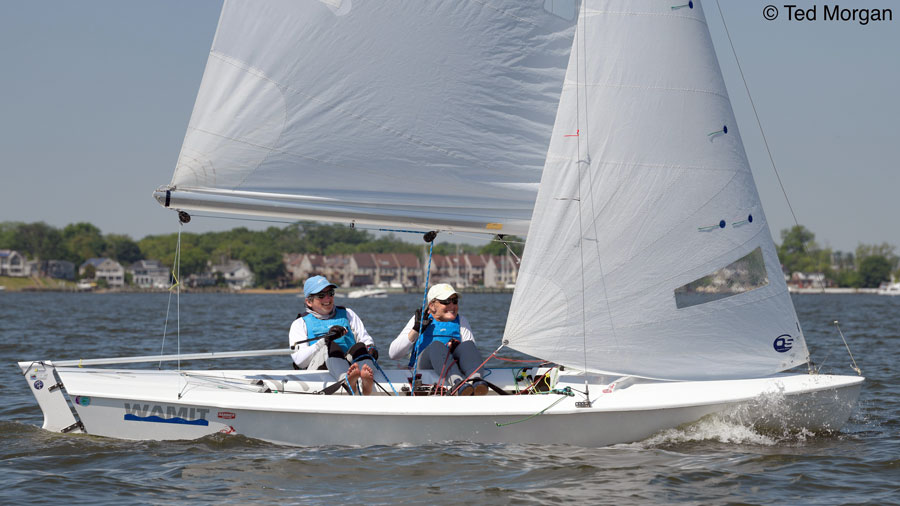Everyone thinks they want answers. But I’ve learned to value the right question, because that’s what sparks a discussion that leads to insight and learning.
A recent Snipe clinic includes a perfect example. Kim and I hadn’t been in the boat for several months, so both our sailing muscles and instincts were rusty. During a pause between races, she asked: “What do you feel like you need to work on in the gym before the next regatta?”

One personal weakness was already apparent on that already steamy morning: “Heat tolerance,” I responded. It didn’t seem like something I could really work on—until we discussed it. Kim’s idea (working out in the middle of the day, instead of my preferred early mornings) kept me thinking about the issue, long after I’d driven back to the relative coolness of a Rhode Island spring. And then on a paddle a few days later, I came up with an easy solution: Overdress for my morning SUP sessions.
My usual instinct is to avoid sweating whenever possible, so as both water and air warm up in the spring I gradually shed those cold-weather layers. By Memorial Day, I’m usually wearing shorts and a lightweight shirt. This year, though, I’m still wearing neoprene, embracing the sweat rather than trying to avoid it. Consciously acclimating to the heat we’ll have at the Snipe Nationals in Annapolis would never have occurred to me if Kim hadn’t asked her key question.
Asking the right question is a large part of coaching, even when the coach doesn’t already know the answer. As Rod Davis put it in one of his many excellent Seahorse columns, “Collectively all the expertise and answers already exists within each of the individuals on those teams. I ask the questions that bring out that expertise.” (Later he adds, “In the end, it’s like practicing psychology without a license.”)
Even working with a coach, none of us will always be able to come up with the right questions ourselves. That’s why I so enjoy sailing with a smart teammate—as well as picking the brains of other Snipe sailors in pre-race fleet discussions. Asking exactly the right question requires a unique combination of perspective, knowledge, and spontaneity—and often tackles a surprisingly mundane topic (like heat tolerance).
So here’s to a little extra sweat.
PS: For those of you who also have trouble with heat tolerance, Hammer Nutrition’s Endurolytes are my magic brain pills. For more details, send me an email or leave a comment below. I read every single one, thank you!
Carol- during my sail camp days, it would take me two weeks of being outside every day, all day to develop that heat tolerance! Then, I was good to go for the rest of the summer. Time outside and good fluid replacement (read Hammer) seem like a winning combo to me! Good luck at Nationals, and we’ll see you there….
Karen,
Thanks for the reminder that it does get better with time. And yes, Hammer endurolytes and HEED are my saviors! See you next week.
More great insight, thanks Carol!
As a coach in the dirt and on the water there are many ways to spur better technique. Asking clients the right question can help them find the solution to their own challenges. Quite often it seems that if they are able to discover a key to their own progression it immediately becomes more readily attainable for them.
Thanks for “putting this on paper” to help me sort it out!
Dave, always glad to hear from your perspective. I think we learn better and lessons stay with us longer if we come up with our own answers!